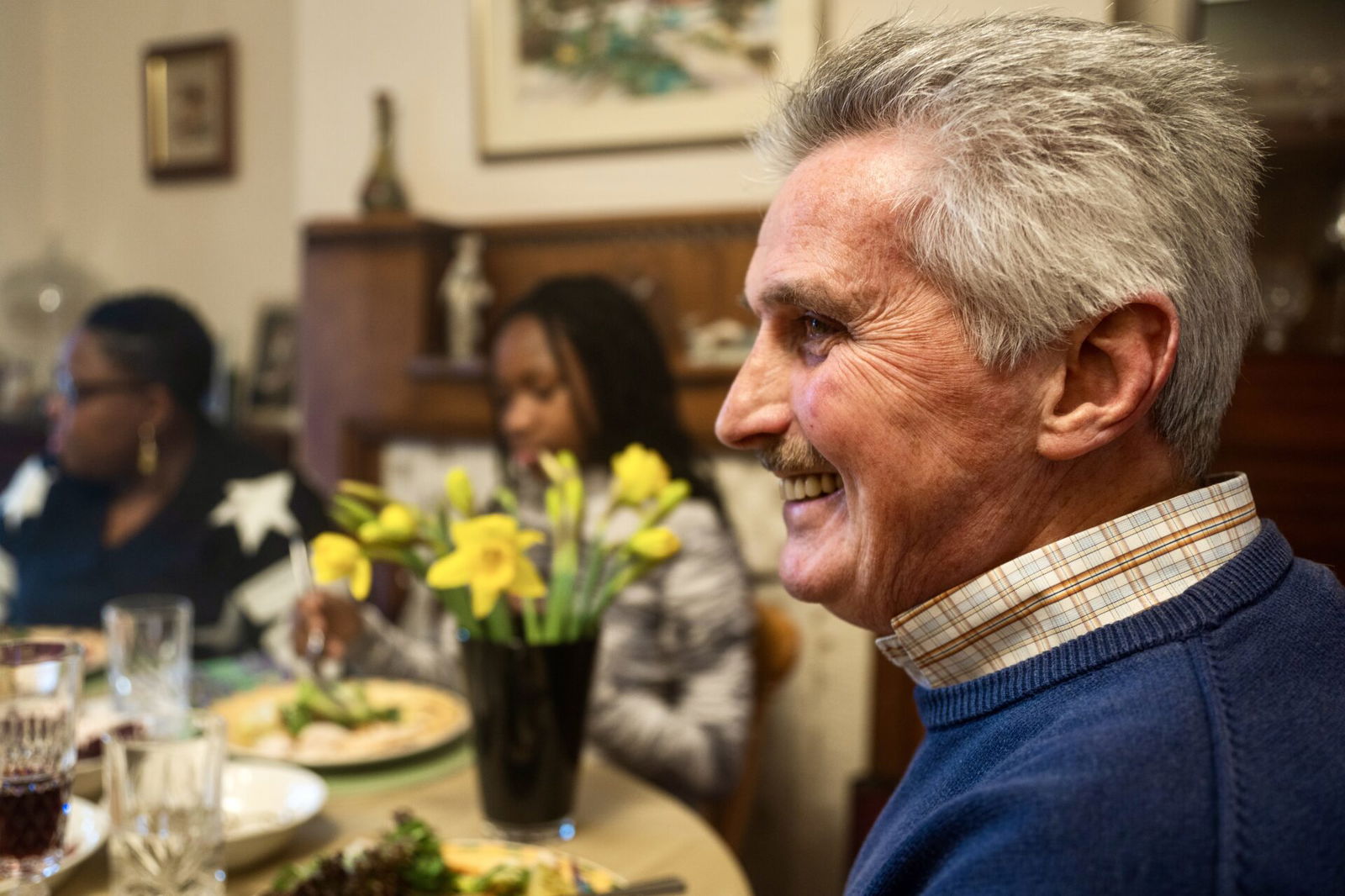





Written by Adam McIlroy.
19 minute read
Article reviewed by Judy Carole, Published Author on March 6, 2025.
Talking about death and dying with our loved ones is simultaneously one of the hardest and yet one of the most necessary things that we can ever do. It’s not just key for helping family members to understand each other’s funeral wishes, but also for getting the various parts of our legacy planning sorted.
In this article, we want to talk about some of the different reasons why both those who are dying, as well as those who have relatives who might be dying, can find this topic so difficult. We’d also like to offer some friendly advice, from our own experience of planning funerals, on how to rise to the challenge of facing one of our greatest conversational challenges: how to start a conversation about death.
Key Takeaways

When faced with a moment in which we need to talk about death, we can often be overcome by a sense of fear or embarrassment that gets in the way. Rather than saying what we want to say, we might pass things off with a joke, or let it fade away inside, never really getting at the deeper need to express ourselves. But exploring our feelings with those we love about the process of dying, or about what happens next, is really important for both parties.
Once we know that someone close to us is dying, it can be hard to keep the person they were (indeed, still are) in view when that new piece of information keeps intruding into our thoughts. We might feel the conflicting need to acknowledge the fact they are dying, lest we offend them for seeming not to care or notice, along with the desire to help take their mind off of that fact, and to treat them just the same as we always have. We may also feel some or all of the following:
With all of this on our minds, it’s no wonder that we can find broaching the subject difficult, especially if on top of all that, we also have the feeling that we are running out of time to say something meaningful.
Many of the same concerns weigh on the minds of those who are dying themselves. As well as the concerns felt by their loved ones who are losing them, they may also be experiencing:
In both the case of those losing someone, and those who may be dying themselves, the best way to start a conversation as important as this is to keep it simple and to adopt a gentle demeanour.
Listen out for ‘tester questions’ from those around you which might indicate that they are trying to start a conversation about dying. These might include examples like “What song means the most to you?” or “Do you think there is an afterlife?”. Something simple that is close to the subject of dying, but general enough to be safe. These could be the person’s way of showing you that they’d like to talk about the best funeral songs for them or their beliefs on death and funerals, for example.
You could also try opening the door by asking similarly simple questions – your loved one might not take you up on the conversation immediately, but they will recognise that you are open to the possibility of talking, which could help them to get something off their chest and feel less alone when they are ready.
One of the most meaningful gestures you can make to a dying person is to show that you’re willing to listen. Here are some helpful pointers for good listening which can help you to open up communication with your loved one.
Those who are dying aren’t necessarily looking for a philosophical debate about Creation, as much as they are for reassurance. Try to be mindful of that person’s beliefs or outlooks and respect those boundaries.
You won’t have all the answers, and that’s okay. Try to simply share what you’re thinking authentically, rather than crafting an answer that you think is what a dying person wants to hear, or which would make you appear wise. They want to know what you truly think.
Don’t be afraid to use humour if you think your loved one would appreciate it, but pay attention to whether you want to use humour because you yourself are uncomfortable, and ask yourself whether you are trying to avoid a more uncomfortable point.
Eye contact can be a powerful way of connecting on a deeper level with someone, helping them to feel that you are truly listening. Try to absorb what they are saying as well as how they are saying it. What is their tone of voice? Observe any changes in the colour of their face, their willingness to hold your gaze and to engage with you.
Ask yourself whether your loved one’s body language fits with what they are saying, and try to understand whether they are really trying to say something different. If so, don’t be shy about inviting them to share what’s really on their mind.
It’s perfectly natural to feel a bit embarrassed by this kind of emotional intimacy; you may also be fearful of seeing your relative or friend cry or become helpless and vulnerable. Breathe slowly and deeply to help yourself to keep calm.
Ground yourself by physically feeling your feet firmly on the floor. This will help you to be present and accepting of what is happening.
When asking indirect questions, you could try things like ‘I wonder whether there’s anything you want to talk to me about?’ or ‘Perhaps there’s something bothering you which you want to tell me about?’. This gives your relative or friend the choice of saying yes or no. They may decline initially, but will know the door is open if they want to talk about it later. Indirect, exploring questions give the signal that you are safe to talk to, and that you care.
You can also gently ask leading questions to find out how they are feeling, such as, ‘If you become really ill, would you like me to sit with you?’ or ‘Have you thought about what kind of service you would like at your funeral?’. Again, this provides the dying person with the choice to respond or not.
Short statements can also provide comfort. You might say, ‘If there ever comes a time when you want to talk about something or you feel frightened, please do tell me’. This gives your relative or friend permission to talk in his or her own time, without expectation.
It’s okay to feel emotionally overwhelmed and to cry; crying is a natural response to emotionally charged situations. Being brave enough to express your grief can have a powerful healing effect on your relationship, as well as giving your relative or friend permission to grieve for the life they’ve lived.
Don’t feel you have to talk all the time. Just being there quietly at the bedside is important, and can often be surprisingly peaceful, especially if your loved one simply wants to be alone with their thoughts. It’s a fact about death that we might become more distant or drawn into ourselves, as we approach the end.
Cruse Bereavement Support offers useful guidance on approaching the subject of death with people from many different angles, including advice on what not to say when talking to someone who has just suffered a loss.

As adults, we naturally want to try to protect children from the gravity of death and dying. But children are more open to these subjects and capable of understanding them than we might realise. They can also develop harmful assumptions and fears about dying without proper guidance.
Where possible, try to let the natural inquisitiveness of children guide the conversation, following their lead. It’s important that they are able to ask what they want to ask, and to develop their own opinions.
Help them to understand that death is a natural part of life, and that it comes to us all. If possible, it can be helpful to connect the subject to moments in their own lives, for example, if a family pet died, or perhaps if a character in a favourite film or book of theirs happened to die. Indeed, there are some great stories about death which are appropriate for children, and which they might find useful to engage with. This can help them to see the subject in more familiar terms, and to relate it to their own lives.
Children respond to body language and social cues just like adults do. As Hospice UK says, children are more likely to ask practical questions such as “what does a dead body look like?” or “what’s inside a coffin?” as opposed to questions of an emotional nature. Here are some children-specific pointers that you might find useful.
Dementia and end of life are closely linked. When talking about the subject of death with one who has dementia, whether in general or perhaps if you are breaking the news to them that they themselves are dying, it can be especially difficult. Not only do you have all of the usual difficulties discussed above to contend with, but you also have the limitations of the condition itself.
You may find that you have to break bad news repeatedly if your loved one is not able to remember it. In cases where you are explaining to a loved one with dementia that someone they were close to has died, you may have to decide (on the basis of how close they were) whether it is worth breaking the news at all.
Dementia UK provides some helpful tips on how to raise this subject with someone who has dementia, some of which we share below. There is some overlap between this advice, and the advice about speaking with children, such as the suggestion to use clear, direct language and to avoid euphemisms. Other tips include:
Listen for moments where your loved one with dementia is asking about someone who has since died. You can use this as an opportune moment to more naturally (re)explain the bad news about them. It should help your loved one to more easily process the information.
Share the news at a time of the day when your loved one is at their best, for example, after they’ve rested or eaten.
Don’t delay or put off sharing the news, especially if the person’s absence is causing your loved one concern or agitation.
Reflecting together on the deceased or ill person, or looking through photographs of them can help your loved one with dementia process the grief, and celebrate their life.
Keep an eye on your loved one’s state of mind. If they seem agitated or upset, make sure to offer comfort or perhaps seek a distraction by engaging in an activity with them which they enjoy.
There is still a taboo in our society re talking about death, but remember: discussing death doesn’t make it come closer, it only makes it easier to deal with. By opening yourself up to conversations about dying, you can be a guide for loved ones struggling with a burden, as well as a midwife for other difficult conversations.
Aura was founded by Paul Jameson and his son Dave (our CEO) specifically to help fight this taboo, after he was diagnosed with motor neurone disease back in 2017. Paul’s journey with a terminal illness has helped him to understand the importance of talking about death with those close to him. Aura’s mission to help families with their end-of-life planning comes directly out of Paul’s own effort to put things in place for his own family.
Whether we are religious or not, the need to confess is a deeply human experience. By broaching the subject of a loved one’s mortality with them, you can bestow a sense of peace upon them that may help them to understand the importance of tying up loose ends before they run out of time. It can also help you to say goodbye more meaningfully.
Helping a dying loved one to put their house in order before they die can be one of the most meaningful and important things it’s possible to do.
If we don’t find the courage to talk about what we want for our own funeral, whether that’s the type of ceremony, the format, or even the music, we may end up with something that doesn’t reflect who we are. If you’re considering a simpler option and wondering is direct cremation a good idea?, it can help to start a gentle conversation with your family. Sharing your wishes early on gives them time to understand your choice and ask questions, and can bring peace of mind to everyone.
Starting a conversation about death gives us the chance to take control of our legacy, get our wishes on the record, and maybe even start assembling a funeral arrangements checklist. Having a funeral that reflects what we want not only gives us a sense of having tied up loose ends, it can also help our loved ones to come to terms with our loss if our funeral is more personal to us.
If there’s anything at all that’s been raised by this article which you’d like to ask us about, or if you’d like our help to get your own funeral plan sorted, then we are ready to assist you. Please don’t hesitate to give us a call.



If you have any questions, would like a brochure or simply would like a chat through our services, our award-winning team is here to help.
Unlike other providers, we won’t hassle you with constant calls. We’ll simply ensure you have the information you need and leave you to come to a decision in your own time. When you’re ready for us, our team will be ready to help.
Talking about death helps bring emotional clarity, strengthens family understanding, and allows people to express their wishes before it’s too late. It also removes fear, helps with closure, and supports practical planning like funeral arrangements or end-of-life care.
Common reasons include:
Fear of causing distress
Worry about saying the wrong thing
Fear of one’s own mortality
Uncertainty about religious or spiritual differences
Lack of privacy or emotional readiness
Societal taboos around the subject
Both those who are dying and those close to them often feel a mix of avoidance, fear, guilt, or confusion.
Start gently. Use simple, indirect questions like:
“What kind of music would you want at your funeral?”
“Have you ever thought about what happens after we die?”
“Is there anything you’d want me to know or do if you became very ill?”
These open the door without pressure.
Listen actively — let them speak without interruption.
Be respectful — honour their beliefs and avoid correcting or debating.
Be honest — you don’t need all the answers; just be real.
Use open body language — eye contact, gentle tone, relaxed posture.
Use short, reassuring statements — e.g. “I’m here if you want to talk.”
Allow silence — presence matters as much as words.
It can be, depending on your loved one’s personality. Humour can bring relief and connection — just make sure it’s not being used to avoid deeper emotions or uncomfortable truths.
That’s okay. Let them know the door is open, and respect their readiness. Saying something like, “Whenever you feel ready, I’m here to talk,” creates a safe emotional space.
Follow their lead — let their curiosity guide the conversation.
Use clear, factual language (e.g. “died” instead of “gone to sleep”).
Reassure them that grief is natural.
Be honest if you don’t know the answer to a question.
Use stories or books (like The Memory Tree) to help them understand.
Yes. It’s healthy for children to see that grief is normal. Expressing sadness can give them permission to do the same and builds trust.
Use clear, direct language — avoid euphemisms.
Choose a calm, quiet moment, when they’re well-rested.
Use active listening — if they ask about someone who has died, it may be a natural moment to re-share the news.
Look at photos or share stories together to aid memory and reflection.
Observe their mood and respond with comfort, or gently change the subject if needed.
“I wonder if there’s anything you’ve been wanting to talk about…”
“Have you thought about what kind of service you’d like?”
“If you ever feel scared or worried, I’d love to help however I can.”
“You can talk to me about anything, whenever you want.”
It allows people to express their funeral wishes, document decisions, and take control of their end-of-life choices. This makes things easier for loved ones and ensures their legacy is respected — whether it’s choosing a direct cremation or planning a more traditional service.
Aura was founded to help people navigate death and dying with clarity, support, and compassion. From helping families plan funerals to starting conversations about assisted dying or legacy, Aura’s mission is rooted in personal experience — inspired by founder Paul Jameson’s journey with terminal illness.
Be present. Sit with them quietly. Offer small kindnesses. Keep communication open, but don’t force it. Your calm and steady support can make more difference than words alone.
You don’t need to have the perfect words. Focus on being sincere and present. Avoid:
Clichés like “everything happens for a reason.”
Platitudes like “they’re in a better place,” unless you know it aligns with their beliefs.
Minimising their experience.
Instead, say things like:
“I can’t imagine how hard this is.”
“I’m here for you.”
“You mean a lot to me.”
It’s never too late. Even quiet moments near the end can be profound. If words fail, touch, eye contact, and presence speak volumes. The most important thing is to show that you care.